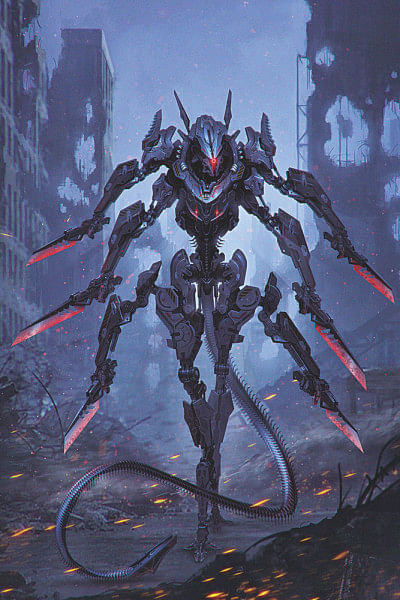Imperial justice

The machine wandered into town a week after the child's death.
The outlaws on the borders watched its slow advance with trepidation, fingering their triggers but daring little else. Its decrepitude and strange garb would have made it an object of ridicule, another relic of the First Empire living past its scrap date. But the red flesh and the chitinous blue-green woven along the exposed plasteel beneath its loose kimono and poncho announced its true nature to all keen-eyed marksmen. A biomachine. A Knight of the First Empire.
The streets emptied in advance as the Knight, seemingly unconcerned by the eerie silence and the eyes watching behind twitching curtains, walked into the humble town square. It stepped carefully away from the droppings of kolos and cats, and glanced at the Stars and Stripes proudly flying before the doors of the civic building. The Empire considered the American faith a heresy - or rather, had considered. The existence of the First Empire had gone from a galaxy-spanning fact to a rumour, a folktale. One wondered if the Knight understood that its time had passed, that it itself was a legend.
The Knight paused before the memorial tree, and withdrew from the folds of its clothes a dry wreath of uncertain foliage. Locating the spike driven into the tree's bark from which hung other flowers, beads, eagle medallion, prayer flags and a plastic name card that said, "Yuna Wu, aged 5" the Knight put the wreath in place.
Then it turned around and roared in an archaic accent laced with an undertone like the buzzing of flies, "The coward called Cutter shall present herself to me below this tree within the space of two hours! The Empress' justice has been long absent from this settlement, but some crimes sound louder than others. I am here now. Relay this message to her."
The Knight knelt with bowed head, facing again the tree and its many hundreds of stakes, each a testament to a violent death.
Cutter arrived after an hour had passed, with her entourage in tow. Her antimaterial pistol was holstered in plain sight, but she wore pleasing clothes and a pleasing smile. Her right hand woman carried a gift of a beautifully carved long bone flute, a local speciality. Many Knightly orders had been said the prize musicianship.
"It's like something out of the stories, sir," said the wily Cutter. "We've long missed the justice of the Empress in our hell away from hell, but we try to make do. It's not a pretty place, you understand. Back in old Sol you could rule with pen and ink from a neat office building. Out here? It's the gun, and guns kill people, fact of life. The girl's death was a tragic accident, but I rest easy for it. She died while we fought to control this town, the only way there is to rule when it's everyone for themselves. What would I rather do instead, leave everyone to their own devices? Each person their one warlord? There'd be tenfold as many stakes in that tree, sir Knight. And no haiku would bring them back."
The Knight politely pondered Cutter's words and responded,
"This dream does not last.
I must live before waking.
My shame dries my throat."
"Very pretty," marveled Cutter. "What does it mean?"
"You do not have the time to reflect on it." The Knight ducked, dodging fire from some hidden sniper firing from an upstair window. Rising from its crouch it struck Cutter's henchwoman in the chin, sending her reeling. Cutter herself reached for her pistol but was no match for the machine's reflexes: a well-aimed pair of blows to her abdomen. Covering fire zinged over their heads and struck the dirt - aim poor, for none wished to hit their leader instead of the Knight. Not wasting time, the robot pitched its poncho at the main body of Cutter's troops, the wide, tasseled cloth obscuring their line of sight.
When next they saw it, the biomachine had unmasked its weapons. The twin laser blades of the Knightly Orders gleamed out of the mists of time, and beneath them another pair of limbs held a more modern invention: a high velocity flechette gun. The swords took Cutter down, cleanly slicing through her as though her body were hot butter. The flechette gun switched from target to target with perfect aim. The Knight ran faster than its human opponents could track, and too unpredictably for them to lead their target. One by one they went down as the gun and swords locked on them.
When the last of Cutter's crew was slain, the Knight took lifted up its dead opponent's high-powered rifle and sent a bolt at the sniper that had taken a shot at it earlier. Peace fell. The townspeople were silent, well-hidden from the carnage in the square.
The Knight strode to the Rebel pennant on its pole, and chopped it down with a sword stroke. Slicing away at the wood it produced 16 identical stakes - these it pinned to the memorial tree. Wordlessly it left the town, having avenged unlawful death. Cutter's absence would doubtlessly boil over into a greater war as those weaker than her would vie for her empty throne. More blood would be spilled.
This was beyond the Knight's concern. The Knight only knew to right what it knew to be wrong. In time it would return to drive more stakes into the bark of tree, until perhaps it stood like a porcupine alone in the midst of a town of ghosts. Such is the Empress' law, and rightly is it feared.
Zoheb Mashiur is an artist and a regular contributor to The Daily Star.

 For all latest news, follow The Daily Star's Google News channel.
For all latest news, follow The Daily Star's Google News channel. 



Comments